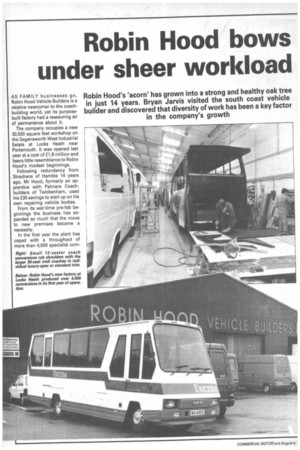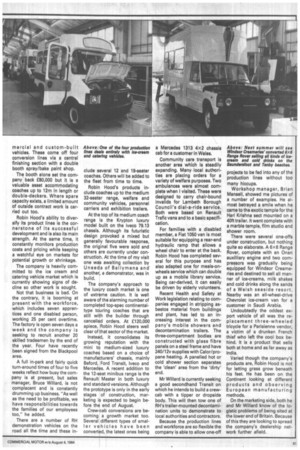Robin Hood bows under sheer workload
Page 62

Page 63

If you've noticed an error in this article please click here to report it so we can fix it.
AS FAMILY businesses go, Robin Hood Vehicle Builders is a relative newcomer to the coachbuilding world, yet its purposebuilt factory had a reassuring air of permanence about it.
The company occupies a new 30,000 square feet workshop on the Segensworth West Industrial Estate at Locks Heath near Portsmouth. It was opened last year at a cost of £1.8 million and bears little resemblance to Robin Hood's modest beginnings.
Following redundancy from Strachans of Hamble 14 years ago, Mr Hood, formerly an apprentice with Palmers Coachbuilders of Twickenham, used his £30 savings to start up on his own repairing vehicle bodies.
From its war-time pre-fab beginnings the business has expanded so much that the move to new premises became a necessity.
In the first year the plant has coped with a throughput of more than 4,000 specialist corn mercial and custom-built vehicles. These come off four conversion lines via a central finishing section with a double booth spray/bake paint shop.
The booth alone set the company back £80,000 but it is a valuable asset accommodating coaches up to 12m in length or double-deckers. Where spare capacity exists, a limited amount of outside contract work is carried out too.
Robin Hood's ability to diversify its product lines is the cornerstone of its successful development and is also its main strength. At the same time, it constantly monitors production costs and pricing while keeping a watchful eye on markets for potential growth or shrinkage.
The company is heavily committed to the ice cream and catering vehicle market which is currently showing signs of decline so other work is sought.
Not that business is bad. On the contrary, it is booming at present with the workforce, which includes seven apprentices and one disabled person, working 25 per cent overtime. The factory is open seven days a week and the company is seeking to recruit another 20 skilled tradesmen by the end of the year. Four have recently been signed from the Blackpool area.
A full in-park and fairly quick turn-around times of four to five weeks reflect how busy the company is at present, but sales manager, Bruce Willard, is not complacent and is constantly drumming up business. "As well as the need to be profitable, we have responsibilities towards the families of our employees too," he added.
There are a number of RH demonstration vehicles on the road all the time and these in clude several 12 and 19-seater coaches. Others will be added to the fleet from time to time.
Robin Hood's products include coaches up to the medium 32-seater range, welfare and community vehicles, personnel carriers and exhibition trailers.
At the top of its medium coach range is the Krypton luxury model built on the lveco 79.13 chassis. Although its futuristic design provoked a mixed but generally favourable response, the original five were sold and others are currently under construction. At the time of my visit one was awaiting collection by Uneeda of Ballymena and another, a demonstrator, was in build.
The company's approach to the luxury coach market is one of extreme caution. It is well aware of the alarming number of completed top-spec continentaltype touring coaches that are still with the builder through cancelled orders. At £120,000 apiece, Robin Hood steers well clear of that sector of the market.
Instead, it consolidates its growing reputation with the mini to medium-sized luxury coaches based on a choice of manufacturers' chassis, mainly Beford, Ford Transit, Iveco and Mercedes. A recent addition to the 12-seat minibus range is the Renault Master in both luxury and standard versions. Although the prototype is only in the early stages of construction, marketing is expected to begin before the end of August.
Crew-cab conversions are becoming a growth market too. Several different types of smaller vehicles have been converted, the latest ones being a Mercedes '1313 4x2 chassis cab for a customer in Wales.
Community care transport is another area which is steadily expanding. Many local authorities are placing orders for a variety of welfare purposes. Two ambulances were almost complete when I visited. These were designed to carry chair-bound invalids for Lambeth Borough Council's dial-a-ride service. Both were based on Renault Trafic vans and to a basic specification.
For families with a disabled member, a Fiat 1050 van is most suitable for equipping a rear-end hydraulic ramp that allows a wheel chair to enter at the back. Robin Hood has completed several for this purpose and has also adapted one for meals-onwheels service which can double up as a mobile library service. Being car-derived, it can easily be driven by elderly volunteers.
Recent Health and Safety at Work legislation relating to companies engaged in stripping asbestos material from buildings and plant, has led to an increasing interest in the company's mobile showers and decontamination trailers. The three-compartment bodies are constructed with glass fibre panels on a steel frame and have 240/12v supplies with Calor/propane heating. A panelled hot or cold shower section separates the 'clean' area from the 'dirty' end.
Mr Willard is currently seeking a good secondhand Transit on which he intends to build a crewcab with a tipper or dropside body. This will then tow one of RH's trailer-mounted decontamination units to demonstrate to local authorities and contractors.
Because the production lines and workforce are so flexible the company is able to allow one-off projects to be fed into any of the production lines without too many hiccups.
Workshop manager, Brian Mansell, showed me pictures of a number of examples. He almost betrayed a smile when he came to the exotic temple for the Hari Krishna sect mounted on a 40ft trailer. It went complete with a marble temple, film studio and shower room.
There were several one-offs under construction, but nothing quite so elaborate. A 6x6 Range Rover, complete with an Onan auxilliary engine and two compressors was gradually being equipped for Windsor Creameries and destined to sell all manner of ice-creams, milk shakes and cold drinks along the sands of a Welsh seaside resort. Nearby was an all-wheel-drive Chevrolet ice-cream van for a customer in Saudi Arabia.
Undoubtedly the oddest export vehicle of all was the replacement three-wheeled tricycle for a Parisienne vendor, a victim of a drunken French thief who left the cool box behind. It is a product that sells both at home and as far away as India.
Varied though the company's products are, Robin Hood is not for letting grass grow beneath his feet. He has been on the Continent looking at different products and observing European manufacturing methods.
On the marketing side, both he and Mr Willard know of the logistic problems of being sited at the lower end of Britain. Because of this they are looking to spread the company's dealership network further afield.
























































































